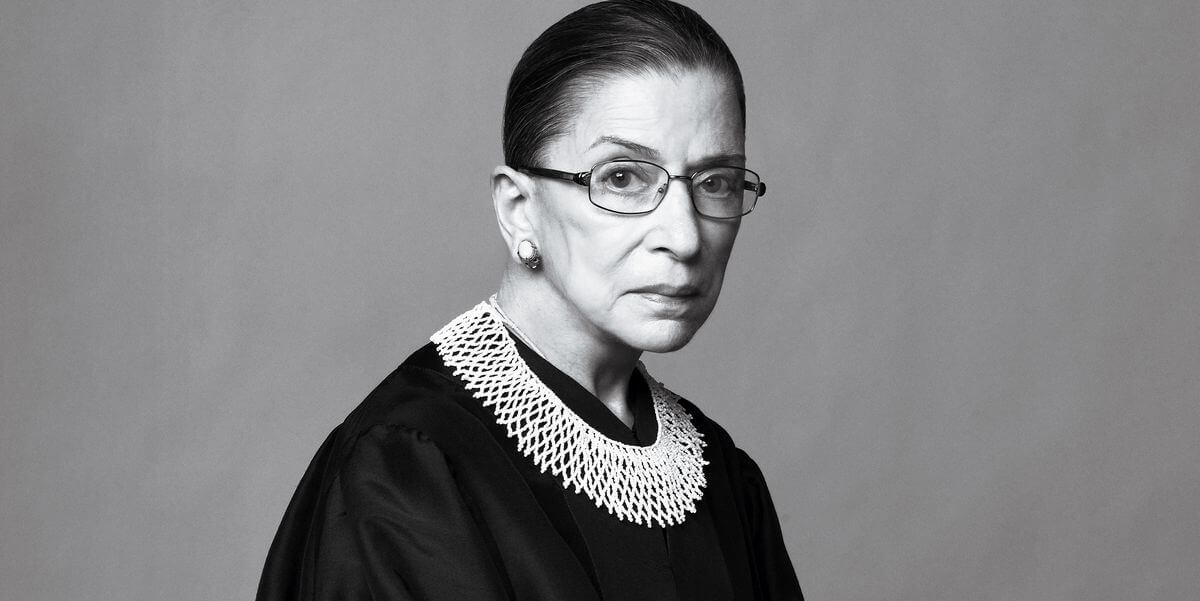Prepared by Cislo & Thomas LLP Attorney Mark D. Nielsen, Ph.D.

For the next several weeks, IP Takeaways intends to pay respect and give honor to Ruth Bader Ginsburg, a judicial icon who will likely go down in as one of the most consequential jurists in U.S. judicial history. Whether one agrees or not with her positions on more social issues, it is undeniable that she was a judicial powerhouse before her time on the Supreme Court, and during her time on the Court.
One thing that is so impressive about her life was her passion for, and amazing intellect applied to, the issues for which she cared about and advocated, while at the same time, her consistent respect, collegiality, and professionalism towards those with whom she did not agree on the issues. Her relationship with her ideological opposite, Antonin Scalia, is well known. This is a lesson that is sorely needed in today’s culture. Being respectful and collegial towards those with whom we disagree is becoming a lost trait, both in the legal profession and elsewhere, and that is sad. It would be great if, collectively, we can honor RBG’s legacy of respect, collegiality, and professionalism towards her ideological opposites by doing the same ourselves.
That said, over the next several weeks, IP Takeaways will consider RBG’s positions in IP cases. Interestingly, many IP cases handled by the Supreme Court result in unanimous decisions. For example, many patent cases that are fundamental to patent litigators, which were decided while Ginsburg was on the Court, were (dare we say, shockingly) unanimous opinions. See, Markman v. Westview Instruments (claim construction); Pfaff v. Wells Electronics, Inc. (on sale bar); Festo Corp. v. Shoketsu Kinzoku Kogyo Kabushiki Co. (prosecution history estoppel); KSR International Co. v. Teleflex Inc. (obviousness); Mayo Collaborative v. Prometheus Laboratories (patentable subject matter); Octane Fitness v. ICON Health & Fitness (exceptional case); Nautilus, Inc. v. Biosig Instruments (indefiniteness); Halo Electronics v. Pulse Electronics (enhanced damages); Apple v. Samsung (design patent infringement and damages).
There are, however, some patent decisions from the Supreme Court in which Justice Ginsburg may have voted with the majority, but offered some additional comments. See e.g., Warner-Jenkinson Co. v. Hilton Davis Chemical Co. (doctrine of equivalents), in which Ginsburg concurred in the Court’s opinion, stating:
separately to add a cautionary note on the rebuttable presumption the Court announces regarding prosecution history estoppel. I address in particular the application of the presumption in this case and others in which patent prosecution has already been completed. The new presumption, if applied woodenly, might in some instances unfairly discount the expectations of a patentee who had no notice at the time of patent prosecution that such a presumption would apply. Such a patentee would have had little incentive to insist that the reasons for all modifications be memorialized in the file wrapper as they were made. Years after the fact, the patentee may find it difficult to establish an evidentiary basis that would overcome the new presumption. The Court’s opinion is sensitive to this problem, noting that “the PTO may have relied upon a flexible rule of estoppel when deciding whether to ask for a change” during patent prosecution.
In eBay Inc. v. Mercexchange (permanent injunctions), Justice Ginsburg joined a concurrence written by Justice Roberts that expressed a desire to see injunctions generally granted when a patent is shown to be infringed.
In Bilski v. Kappos (patentable subject matter), Justice Ginsburg joined an elaborate concurring opinion written by Justice Stevens that argued for business method patents being unpatentable and advocating for a narrower description applied to the word “process” in 35 U.S.C. 101.
In Alice Corp. v. CLS Bank International (subject matter eligibility), Justice Ginsburg joined the Justice Sotomayor concurrence that continued the argument against business method/abstract idea patents from Justice Stevens’ concurrence in Bilski.
While Ruth Bader Ginsburg will be remembered for her work and jurisprudence in connection with issues largely unrelated to intellectual property, she also participated in many decisions in patent cases, as noted above, that greatly impact the rules and laws that we, as patent litigators, consider, analyze, and apply on a daily basis. Next week, we will look at Justice Ginsburg’s involvement in several notable trademark cases that shaped the trademark laws that we as IP lawyers regularly consider.
Photo Credit: https://www.elle.com/culture/career-politics/interviews/a14788/supreme-court-justice-ruth-bader-ginsburg/



